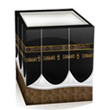The ruling on the Athan and the Iqamah for the Single worshipper
- Details
- Category: Sheikh Bin Baz
- Published on Tuesday, 05 November 2013 11:33
- Hits: 618
The ruling on the Athan and the Iqamah for the Single worshipper
Question:
A brother asked, saying: I sometimes perform the obligatory prayers alone due to the absence of any mosque near to me; am I required to call the Athan and the Iqamah for every prayer, or is it allowed for me to pray without Athan or Iqamah?
Answer:
The Sunnah is to make the Athan and the Iqamah, as for its obligation, there is a difference of opinion in this among the scholars, however, the best and the safest thing is to make the Athan and Iqamah, in accordance with the general meaning of the evidences. But you are required to pray in congregation whenever you can do so; and if you find a congregation, or hear the call to prayer in a mosque near to you, it is an obligation for you to respond to the Muýaththin and attend the congregation prayer. If you do not hear the Athan, and there is no mosque near to you, then the Sunnah is for you to call the Athan and Iqamah and then pray.
Shaykh `Abdul-`Azeez Bin Baz
Fatawa Islamiyah Darussalam Vol:2 page no.137





















